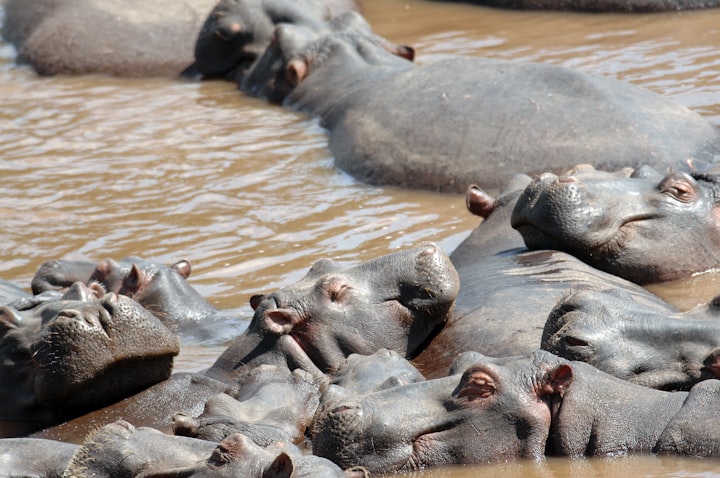"Colombia's Cocaine Hippos: From Drug Lord's Pets to Ecological Marvels"
The story of the cocaine hippos is an example of the challenges and consequences of human interaction with the natural world.

The cocaine hippo, also known as the "Pablo Escobar's hippos," is a group of hippos that are descendants of four hippos that were brought to Colombia by the infamous drug lord, Pablo Escobar, in the 1980s. These hippos have gained international attention due to their unique origin story, as well as their potential impact on the local ecosystem. In this article, we will discuss the history of the cocaine hippos, their impact on the environment, and the challenges of managing their population.
History of the Cocaine Hippos
Pablo Escobar was one of the most notorious drug lords in history, and he was also known for his extravagant lifestyle. In the 1980s, he built a private zoo on his estate in Hacienda Nápoles, which included a variety of exotic animals, including four hippos. When Escobar was killed in 1993, the government took control of his estate and many of the animals were relocated to other zoos.
However, the hippos were left behind because they were considered too difficult and expensive to move. With no natural predators in Colombia, the hippos thrived in the warm climate and abundant water sources. Over time, they began to reproduce, and today there are an estimated 80-100 cocaine hippos living in the country.
Impact on the Environment
The cocaine hippos are not native to Colombia, and their presence has raised concerns about the impact they may have on the local ecosystem. Hippos are known to be herbivores and consume up to 150 pounds of vegetation each day, which can have a significant impact on the surrounding plant life. In addition, their waste can pollute water sources and potentially harm aquatic animals.
There is also concern that the hippos could spread diseases to other animals or even humans. Hippos are known carriers of various diseases, including anthrax and tuberculosis, which can be transmitted through contact with their waste or saliva.
Despite these concerns, some experts argue that the hippos could have a positive impact on the ecosystem. In the absence of large herbivores like the hippo, many plant species in Colombia have evolved to be less palatable, which has limited the growth of certain types of vegetation. The introduction of the hippos could potentially help to increase the diversity of plant life by consuming the less desirable plants and allowing other species to thrive.
Challenges of Managing the Population
The growing population of cocaine hippos in Colombia presents a unique challenge for conservationists and government officials. The hippos are not considered an endangered species, so they do not receive the same protections as other animals. However, their unique origin story has made them a popular tourist attraction, and some people have even advocated for their protection.
One of the biggest challenges in managing the hippos is determining the best course of action. Some conservationists have argued that the hippos should be sterilized to prevent further population growth, while others believe that they should be culled to prevent potential harm to the ecosystem. However, both of these options are controversial, and there is no clear consensus on the best approach.
Another challenge is the logistics of managing a large population of hippos in a country with limited resources. The hippos are spread out across a wide area, and capturing or relocating them is a difficult and expensive process. In addition, the hippos are often located in remote areas, making it difficult for officials to monitor their movements and behaviors.
At the same time, the story of the cocaine hippos also raises important questions about the ethics of exotic animal ownership and the responsibilities that come with it. While Pablo Escobar may have been known for his lavish lifestyle and disregard for the law, the fact remains that his decision to bring these hippos to Colombia has had lasting consequences for both the animals and the environment.
Moving forward, it will be important for conservationists, government officials, and the public to work together to find a solution that balances the needs of the hippos with the long-term health of the ecosystem. This may involve difficult decisions and compromises, but it is essential if we hope to create a sustainable future for both wildlife and humans.
Furthermore, the story of the cocaine hippos is not just about the challenge of managing a population of exotic animals in a foreign ecosystem, but it also raises questions about the ethics of owning exotic animals. The practice of keeping exotic animals as pets or in private collections is a widespread problem that often leads to animals being abandoned, mistreated, or released into the wild where they can cause harm to native species and disrupt the natural balance of ecosystems.
In the case of the cocaine hippos, their origin story is particularly troubling, as it highlights the consequences of the actions of one individual who had the power and resources to obtain and transport exotic animals. Escobar's decision to bring these hippos to Colombia was not based on a desire to help conserve or protect wildlife, but rather on his own personal interests and desires.
This is not to say that all private ownership of exotic animals is unethical or harmful. There are many responsible and dedicated individuals who work to provide proper care and protection for exotic animals in captivity. However, the story of the cocaine hippos highlights the need for greater regulation and oversight of the exotic animal trade to prevent similar situations from occurring in the future.
The challenges of managing the cocaine hippo population in Colombia are complex, and there is no easy solution. However, there are a few potential strategies that have been proposed to address the issue. One approach is to continue monitoring the hippos and their impact on the environment while exploring options for managing their population in a humane and sustainable way.
One potential solution that has been proposed is to establish a sanctuary for the hippos, where they can be cared for and protected without posing a threat to the surrounding ecosystem. Such a sanctuary could provide a permanent home for the hippos and also serve as a center for research and education on exotic animal management and conservation.
Another option is to establish a controlled hunting program to manage the hippo population. While this may seem controversial, it is worth noting that hippos are not considered an endangered species and are hunted for meat in some parts of Africa. By establishing a hunting program, officials could manage the hippo population while also providing economic benefits to local communities.
Regardless of the approach taken, it is clear that managing the cocaine hippos in Colombia will require cooperation and collaboration from a variety of stakeholders, including government officials, conservationists, and local communities. It will also require a willingness to consider all options and make difficult decisions to ensure the long-term health and sustainability of the environment and the animals that call it home.
The cocaine hippos are a fascinating group of animals that have captured the attention of people around the world.
The complex challenges of managing wildlife populations are highlighted in their story.
The story of the cocaine hippos is a cautionary tale about the consequences of human actions on the environment.
The challenge that must be addressed if we are to protect the natural world for future generations is that of the Hippos.
We can create a sustainable future for all if we work together to find a solution that works for the environment and the Hippos.
The story of the cocaine hippos is an example of the challenges and consequences of human interaction with the natural world.
There are important questions about the ethics of exotic animal ownership, the challenges of managing non-native species in foreign environments, and the need for greater regulation and oversight of the exotic animal trade.
We can create a sustainable future if we work together to find a solution that balances the needs of the hippos with the long-term health of the environment.
About the Creator
Safeera Sathar
With pen in hand and heart on sleeve,
I weave my thoughts,
My words may not be grand or bold,
Hoping my words will make some gain.
So if you find me on this page,
Know that I write to engage.
To touch your heart, to stir your soul,






Comments
There are no comments for this story
Be the first to respond and start the conversation.